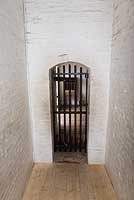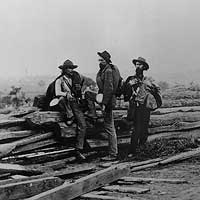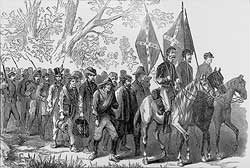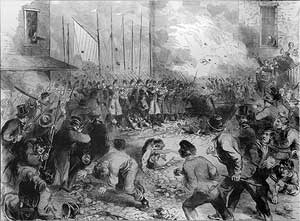| Pratt Street Riot | Baltimore Bastille | Habeas Corpus | Coast Guard | Garrison Flag | Timeline | All Photos |
Baltimore Bastille
During the Civil War, Fort McHenry served as a Union transfer prison camp for Southern sympathizers and confederate prisoners of war. Usually, prisoners were confined at the fort for short periods of time before being transferred to such larger prisons as Point Lookout, Fort Delaware of Johnson's Island.

|
| Fort McHenry Guardhouse Cell. |
Life at Fort McHenry was very difficult. Each prisoner was given one blanket, but was denied bedding, chairs, stools, wash basins and eating utensils. They used a tin cup, pocket knife, hardtack for a plate, and forks and spoons whittled from bits of wood. Prisoners received three meals each day: breakfast, consisting of coffee and hardtack, a second meal of bean soup and hardtack; and a main meal of coffee, 1/2 of salt pork or pickled beef, and hardtack. Occasionally, the meat would be rancid and the hardtack moldy. Those prisoners who could afford to do so, bought fresh fruits, vegetables and comfort items from sutlers. Also, sympathizers from Baltimore sent large quantities of food, clothing, blankets and money.
Prisoners at Fort McHenry During the Civil War

|
| Three Confederates taken prisoner at the Battle of Gettysburg and temporarly confined at Fort McHenry. |

|
| Dejected Confederate prisoners, captured at the Battle of Chancellorsville, march behind their own captured battle flags. |
At times, the inmate population swelled to numbers that severely strained the prison facilities. In February, 1862, there were only 126 prisoners at Fort McHenry. Early in 1863, the number of prisoners totaled 800. However, in July, 1863, following the battle of Gettysburg, there were 6,957 prisoners. After the large Gettysburg influx was dispersed, the monthly total ranged between 250 and 350 prisoners. During the last months of the war, the number dwindled sharply; and in September, 1865, there were only 4 prisoners at the fort. At the end of 1865, only a small detachment of Union troops remained to handle routine maintenance.
In contrast to the high death tolls at other prisons, the death toll at Fort McHenry was only 15. At least three men were executed at the fort. These included a Union soldier hanged for the murder of an officer; another, shot after having been found guilty of desertion and the attempted murder of several civilians; and a confederate sympathizer found guilty of murdering two civilians while practicing guerrilla warfare.
Because of its role as a prison camp during the Civil War, Fort McHenry became know as "Baltimore Bastille."
